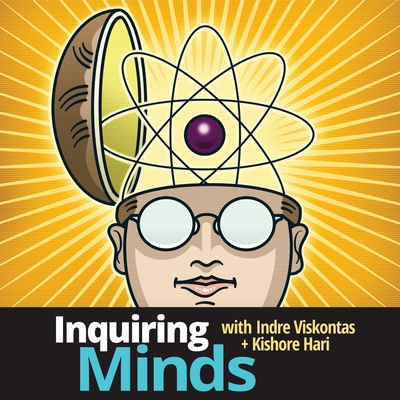Each week Inquiring Minds brings you a new, in-depth exploration of the places where science, politics, and society collide. We’re committed to the idea that making an effort to understand the world around you though science and critical thinking can benefit everyone—and lead to better decisions. We endeavor to find out what’s true, what’s left to discover, and why it all matters with weekly coverage of the latest headlines and probing discussions with leading scientists and thinkers. Inquiring Minds is hosted by neuroscientist and musician Indre Viskontas and science educator Kishore Hari. It’s produced by Adam Isaak in partnership with Climate Desk, a journalistic collaboration dedicated to exploring the impact of a changing climate and consisting of The Atlantic, Center for Investigative Reporting, Grist, The Guardian, The Huffington Post Mother Jones, Slate, and Wired. Our music is provided by award-winning producer Rhian Sheehan. RSS: http://feeds.feedburner.com/inquiring-minds iTunes: https://itunes.apple.com/us/podcast/inquiring-minds/id711675943 Stitcher: http://www.stitcher.com/podcast/inquiring-minds
https://soundcloud.com/inquiringminds
17 Michael Pollan - The Science of Eating Well (And Not Falling For Diet Fads)
The Paleo diet is hot. Those who follow it are attempting, they say, to mimic our ancient ancestors—minus the animal-skin fashions and the total lack of technology, of course. The adherents eschew what they believe comes from modern agriculture (wheat, dairy, legumes, for instance) and rely instead on meals full of meat, nuts, and vegetables—foods they claim are closer to what hunter-gatherers ate. The trouble with that view, however, is that what they’re eating is probably nothing like the diet of hunter-gatherers, says Michael Pollan, author of a number of best-selling books on food and agriculture, including Cooked: A Natural History of Transformation. "I don't think we really understand well the proportions in the ancient diet," argues Pollan on this week’s episode. "Most people who tell you with great confidence that this is what our ancestors ate—I think they're kind of blowing smoke." This week on the show, guest host Cynthia Graber has a wide-ranging conversation with Pollan that covers the science and history of cooking, the importance of microbes—tiny organisms such as bacteria—in our diet, and surprising new research on the intelligence of plants. This episode also features a discussion of the new popular physics book Trespassing on Einstein's Lawn, by Amanda Gefter, and new research suggesting that the purpose of sleep is to clean cellular waste substances out of your brain. Subscribe: itunes.apple.com/us/podcast/inquiring-minds/id711675943 feeds.feedburner.com/inquiring-minds
